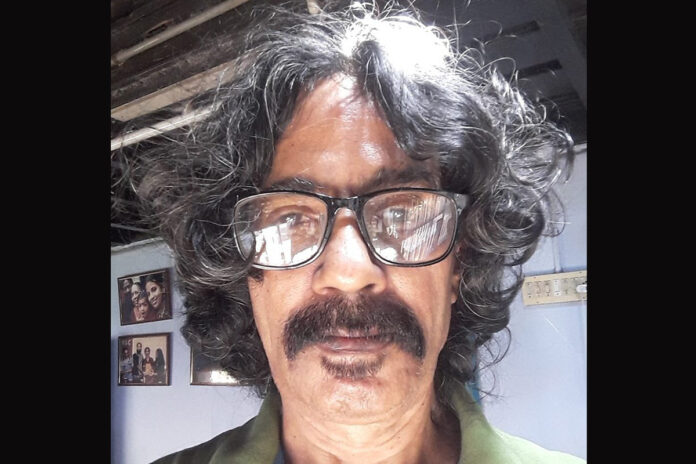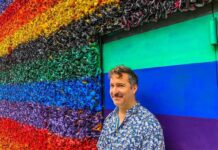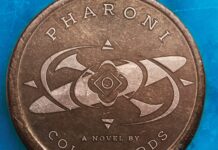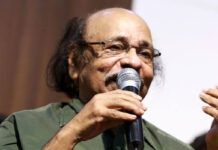Let’s start from the present. You just released a Book of Love. What is that and why is that? How is it different?
It’s a tiny book with 20 pages of poetry. ‘In the mirror, our graves.” A chapbook printed on cheap newsprint using selected typewriter fonts. When my friend and poet Ritamvara Bhattacharya, whom I have never met, said “let’s do a book together”, I said “let it be on the theme of separation in love”. So, she wrote a poem, I wrote a response poem, and so on. In about 10- 20 days, we had 20 poems. But, when you read the book, you will know that no individual poem bears explicit signs of authorship. Also, we decided to distinguish each poem by a year within three centuries which has no historic significance. It is as if the poems have been written by either her or me (smashing the gender barrier) at any point of time (smashing the time barrier.) It happens that somewhere in between the two lovers have died, but their love persists.
Since it had to follow our ideals of a chapbook and no big, medium or small publisher can be expected to give that much attention to it, I searched for an ideal printer to produce such a book and settled on Imperial Press, Dharamshala, HP. Devanarayanan Prasad, my young friend, did the design, and Ritamvara herself did the cover. While it took just a fortnight to write the poems, the other processes took months. People are appreciating the look of the book and the substance of the poems. It was meant to convey a feel of antiquity and modernity and I believe it succeeds.
Your earlier book was also a collection of love poems. How does it differ from this one?
Kintsugi by Hadni is a collection of my poems written over the years, whose basic theme is Love but love not romantically expressed like in the chapbook. It explores all facets of love including all the unmentionables. So, it is variously described as pornographic, bawdy, lewd, immoral, and so on. A romantic lover will never like it. Normally, the soul is associated with love. But, this one places Love in the body. Hence, many a time it becomes explicit. The theme is explored in the poem that bears the book’s title.
You seem to break new ground with every collection. ‘The Bullet Train and other loaded poems’ is out and out political. Love and politics – how do you manage both?
My political belief is against any kind of fascist and totalitarian regime. I do admit that I have a Marxist orientation which doesn’t prevent me from being critical of the so-called Left governments. Neither do I refrain from vehemently opposing any governance/policies based on the ideology of Hindu dominance.
Bullet train is a response to fascism. The collection contains only politically loaded poems. It was written with passion against the Rightist regime which brings out policies that hurt the citizens and fills the coffers of individuals or the party. It was written in 2019 before the revocation of Article 370 or the CAA/NRC Amendments or the Covid policy. Hence I am planning to expand the collection in the next edition.
Now, let’s go back to your beginnings. You have said that you started late. What do you mean by that?
I started writing poetry when I was 55. Now, I am 65. It was my friendship with Indah Widiastuti, a poet/architect based in Indonesia, that flagged me off. I began by editing her poems and progressed to writing my own. I have no proper schooling in English, let alone poetry. I did my college graduation in Science. I haven’t studied Shakespeare or the great English poets.
I had done a lot of street theatre in Delhi where I was working as a Government officer. This theatre was a collective one. I was asked to help with songs and I wrote them in English which someone else translated into Hindi. Maybe these songs were my rudimentary lessons in writing poetry later.
So, how did you publish your first book ‘Architecture of Flesh?’
There were plenty of publishing houses that produced books for a price. I decided to avoid them. I sent it to Poetrywala and waited it out. I believe a call came a year later from Hemant Divate and then it was on. Got an Intro by Meena Kandasamy. The book was a success. A second edition came after two years.
How does your first work differ from the ones that came later?
Architecture of Flesh has me in toto. It’s an omnibus kind of book that deals with every kind of theme like love, politics, fantasy, the surreality of life, problems of existence, etc. The books that come later have only a few of these elements but more elaborately explored. Thus, Architecture of Flesh is a total book for me which shows up a man named Ra Sh in his totality.
You have been doing translations too. Can we talk about it?
I have been regularly translating from English to Malayalam and vice versa. Similarly with Tamil. The latest work is a collection of stories in Tamil by Bama, a Dalit woman writer. I translated it into English and Speaking Tiger published it. Major works that I translated from Malayalam to English include Mother Forest (story of Janu, a tribal leader), Don’t want Caste (collection of Dalit stories in Malayalam translated into English), and How to Translate an Earthworm (an anthology of translated contemporary poetry from Malayalam). I am part of a team doing an Anthology of Women Poets from Kerala since the 1950s in English, led by the thespian poet K. Satchidanandan.
You are familiar with both Indian English poetry and vernacular poetry. Do you dare make a comparison?
What I have found is that Indian English poetry is much inferior to vernacular poetry in exploring new themes and moulding the structure accordingly. Indian English poetry is still obsessed with form. This is also the result of poetry being taught in creative writing courses. You can only teach a form, not a theme. The themes come from life experiences. In vernacular poetry, you can find themes ranging from the streets to metros. One reason is that Indian English poetry is concentrated in the cities. Take Kerala, for example, vernacular poetry comes from every nook and corner written by fish-mongers to Senior Professors, whereas the Indian English Poetry in Kerala is concentrated only in the metros.
Future plans?
Want to bring out my fifth collection of poetry tentatively titled ‘Buddha and Biriyani.’ Looking for a publisher.
About the Author
Ravi Shanker (aka Ra Sh) is a poet and translator based in Palakkad, Kerala. He has published four collections of poetry, Architecture of Flesh (Poetrywala), Bullet Train and Other Loaded Poems (Hawakal), Kintsugi by Hadni (RLFPA), and In the Mirror, Our Graves. A play, Blind Men Write will soon be published by Rubric. Ravi Shanker’s other English translations include Mother Forest (Women Unlimited), Waking is Another Dream (Navayana), Don’t Want Caste (Navayana), Kochiites (Greenex), and How to Translate an Earthworm (Dhauli Books).
















